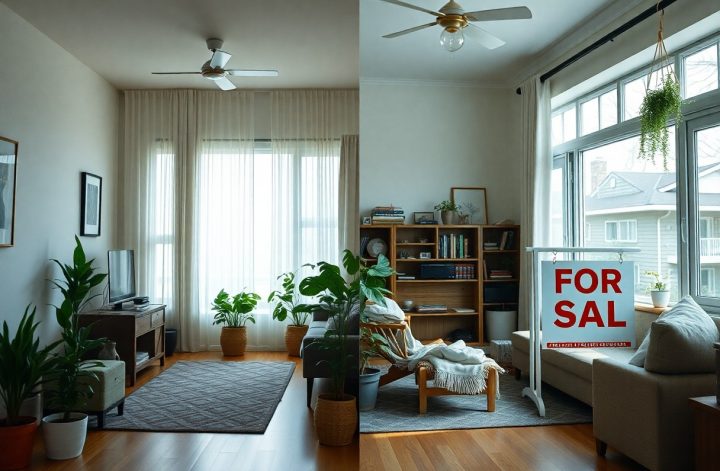With many people claiming that renting is a waste of money, it’s time to examine this common belief closely. You might think that throwing away your hard-earned cash on rent is a poor financial decision, but renting can actually offer significant benefits. In this post, we’ll explore the advantages of renting, situations where it makes financial sense, and provide you with insights to make informed choices about your housing options.
Key Takeaways:
- Renting provides flexibility, allowing individuals to change locations easily without the commitment of a mortgage.
- Renting can be more affordable in the short term, as it often requires lower upfront costs compared to buying a home.
- Investing money saved from renting in other assets can lead to potential growth, offsetting the costs of not owning property.
Understanding the Renting Perspective
Shifting your view on renting allows you to see it as a viable housing option rather than merely a financial drain. Many renters enjoy the flexibility to choose locations that suit their lifestyle, whether for job opportunities or lifestyle changes. This perspective emphasizes the potential advantages of renting, where you can focus your financial resources on experiences or saving for future investments rather than locking them into a property.
Myths About Renting
Common misconceptions surround renting, such as the belief that it equates to throwing money away or reflects poor financial planning. In reality, this mindset overlooks various considerations, including market conditions and personal situations. Many renters find they are financially better off avoiding the hidden costs of homeownership, such as maintenance and property taxes, while also benefiting from greater lifestyle flexibility.
Benefits of Renting
Renting offers numerous advantages that can suit many lifestyles and financial strategies. It typically requires less upfront investment compared to buying a home, allowing you to allocate funds towards other goals. Renting provides maintenance-free living, where landlords handle repairs, freeing you from additional responsibilities. Moreover, you gain the ability to relocate easily if your job or personal circumstances change.
Additionally, renters often save on upfront costs, with many leases requiring only a security deposit and first month’s rent. This affordability can be particularly beneficial for young professionals or those starting fresh in a new city. Renters also benefit from the peace of mind that comes with not being responsible for major repairs or market fluctuations. These factors make renting a logical choice for those prioritizing flexibility and financial agility, rather than a stagnant financial investment.
The Cost Comparison: Renting vs. Buying
Evaluating the costs of renting versus buying reveals significant differences. While renting provides flexibility without long-term commitments, purchasing a home is an investment that can build equity over time. How true is the quote ‘Renting is like throwing money down the drain’ is often debated, but understanding the financial implications will help you make an informed decision. The following table highlights key cost differences:
| Renting | Buying |
| No property tax | Property tax obligations |
| Monthly payments | Mortgage installments |
| Security deposit | Down payment |
| Potential rent increases | Home value appreciation |
Analyzing Long-term Costs
Long-term financial analysis shows that buying a home can yield significant advantages over time. Homeowners typically see property values increase, allowing them to build equity. In contrast, renters may face continuous price hikes without asset accumulation, making renting less financially beneficial in the long run.
Upfront Expenses of Homeownership
Homeownership comes with various upfront costs that you should consider. These include your down payment, closing costs, and moving expenses. Each of these can add up significantly, often requiring thousands of dollars before you can even move in.
For example, a down payment typically ranges from 3% to 20% of the home’s total price, depending on the mortgage type. Closing costs can add another 2% to 5% of the loan amount. This means that if you buy a $300,000 home, you might need $9,000 to $15,000 just for these initial expenses alone, making budgeting necessary before entering the market.
Flexibility and Lifestyle Choices
Renting offers unparalleled flexibility, allowing you to choose different living environments that fit your lifestyle without long-term commitment. Whether you prefer urban living, suburban comfort, or a quieter rural area, renting makes it simple to relocate easily. This flexibility can enhance your overall quality of life, letting you adapt your living situation based on personal and professional needs.
Mobility and Job Opportunities
When job opportunities arise, renting allows you to move quickly without the burden of selling a home. A 2021 study showed that renters are 50% more likely to move for job opportunities compared to homeowners. This mobility can give you a competitive edge in your career, particularly in industries that value diverse experiences or remote work options.
Adapting to Life Changes
Life changes, such as starting a family, shifting careers, or pursuing further education, often necessitate adjustments to your living situation. Renting provides the agility needed to make these transitions smoother. Whether you need a bigger space for a growing family or a smaller apartment after downsizing, renting lets you adapt to your changing circumstances without the stress of a lengthy home sale process.
Your life can change unexpectedly, and each phase may require a different living arrangement. Renting allows you to quickly switch to a more suitable space, whether you’re moving to a city for a new job or downsizing after the kids have moved out. This adaptability saves you time and money, giving you the freedom to explore new opportunities as they arise. Embracing the rental lifestyle can lead to greater satisfaction and comfort in your living situation, ensuring your home continually reflects your current needs.
Financial Investment: The Renting Advantage
Renting offers a unique financial advantage by freeing up your capital for other investments. Instead of tying up large sums in a down payment, you can allocate funds towards stocks, bonds, or even starting a business. This flexibility allows you to potentially achieve greater returns on investments that could outpace property appreciation. The ability to diversify your investments while enjoying a flexible living situation means you can adapt your financial strategy over time, providing not only security but also opportunities for growth.
Investing for the Future
When you rent, you maintain the ability to invest your savings in various markets, which can provide higher returns than real estate. For example, historical data shows that over the long term, the stock market has returned an average of around 7% annually after inflation. This investment strategy can potentially grow your wealth faster than property appreciation, allowing you to build a solid financial foundation for your future.
Building a Diverse Portfolio
Renting enables you to create a diverse investment portfolio, minimizing risk and enhancing your wealth-building potential. By spreading your capital across different asset classes like stocks, mutual funds, and real estate investments, you lower the chances of losing money if one market suffers. This strategic approach to investing can lead to more stable returns over time, ensuring that your financial future remains secure.
Building a diverse portfolio while renting not only provides you with financial flexibility but also reduces exposure to market volatility. For example, investing in index funds can give you instant diversification within the stock market, while bonds may offer stability. The combined exposure to various asset classes can buffer against downturns in any single market. This approach allows you to adjust your strategy based on market conditions, maximizing your growth potential while minimizing risks associated with relying solely on property investments.
Market Conditions: When Renting Makes Sense
Market conditions greatly influence whether renting is a wiser choice for you. In times of rising home prices, renting can provide stability without the burden of a costly mortgage. Additionally, varied rental markets may offer desirable locations at lower costs compared to buying. Familiarize yourself with Top 5 Common Myths About Renting Debunked to better understand how market fluctuations can affect your living situation.
Housing Market Trends
Current housing market trends can significantly affect your decision to rent or buy. In markets with high demand and limited inventory, prices may soar, making it challenging to purchase a home. Alternatively, if there is a surplus of rentals, you may find lower prices and more options available. Keeping a finger on these trends can help you make informed choices.
Economic Factors Influencing Decisions
Economic factors play a vital role in your renting or buying choice. Interest rates, job stability, and local economic conditions can greatly affect your financial ability to purchase a home. In times of economic uncertainty, renting may provide the flexibility you need until the market stabilizes. Consider these economic factors:
- Low interest rates make buying attractive.
- High rental demand can drive prices up.
- Economic downturns can lead to job instability.
- Local growth rates influence housing prices.
- Regional job markets affect rental demand.
Knowing your local economy can help you determine if renting is a short-term solution or a better long-term strategy.
When evaluating economic factors, consider how they impact your personal financial situation. A job loss or decreased hours can make it difficult to maintain a mortgage. Alternatively, if you have a stable income or expect your financial situation to improve, purchasing a home may be more appealing. Key metrics to consider include:
- Employment rates in your area.
- The overall health of the economy.
- Inflation rates affecting purchasing power.
- Local real estate market activity.
- Consumer confidence levels.
Knowing these economic indicators will help you navigate decisions about renting versus buying more effectively.

Expert Opinions on Renting vs. Buying
Experts often challenge the notion that Renting is Throwing Money Away … Right? Financial advisors typically emphasize that renting can provide flexibility and lower monthly costs, allowing you to allocate funds into other investments. Real estate patterns fluctuate, suggesting there are scenarios where renting may actually be more financially sound than buying.
Insights from Real Estate Professionals
Real estate professionals often highlight the unique situations where renting outperforms buying. For instance, renting avoids hidden costs of homeownership, like maintenance and taxes. They mention that in certain high-demand markets, homeowners struggle to recoup their investments compared to renters who enjoy the flexibility to relocate without the burden of selling a property.
Case Studies of Renters and Homeowners
Examining real-life scenarios reveals compelling differences between renters and homeowners. A 2022 study showcased homeowners in a costly market who, after five years, found their property appreciated only by 2% while their rental counterparts invested the difference and saw a 10% return on investment. The following case studies illustrate these contrasting outcomes:
- Case 1: A homeowner purchased a $500,000 property, spent $30,000 on repairs, and after five years sold it for $520,000—yielding a mere 4% total appreciation.
- Case 2: A renter paid $2,500 monthly and invested the saved amount (compared to homeownership costs) into a diversified portfolio, now valued at $175,000 after five years.
- Case 3: A family rented for $3,000 a month in a high-cost area, with no maintenance fees, versus owning a similar house that cost them $4,000 monthly when factoring in expenses.
- Case 4: A young professional rented for $1,800 monthly and put $12,000 into a retirement fund; they now have an estimated growth of $18,000 while homeowners were tied to $12,000 in home repair costs.
Final Words
To wrap up, renting does not always mean you are throwing money away. You may find that it offers financial flexibility and allows you to invest in other opportunities, such as savings or experiences. By weighing the benefits of renting against purchasing, you can make informed decisions based on your personal circumstances. Think about your goals, lifestyle, and market conditions to determine what is best for you. Renting can be a smart choice during certain life stages, providing both stability and mobility.
FAQ
Q: Is renting really just throwing money away?
A: Not necessarily. Renting provides flexibility and can save you from long-term financial commitments. It allows you to invest your savings elsewhere. Additionally, renting includes maintenance costs and property taxes, which are expenses homeowners must cover.
Q: What are the benefits of renting over buying?
A: Renting often requires a lower upfront investment and offers the freedom to move without the hassle of selling a property. Renters are not responsible for maintenance and repairs, which can save time and money over the years.
Q: Can renting be a smart financial decision?
A: Yes, renting can be smart, especially if housing market conditions are unstable. It allows you to allocate your money towards investing, building an emergency fund, or pursuing other opportunities. It’s important to evaluate your current financial situation and future goals to determine what works best for you.




